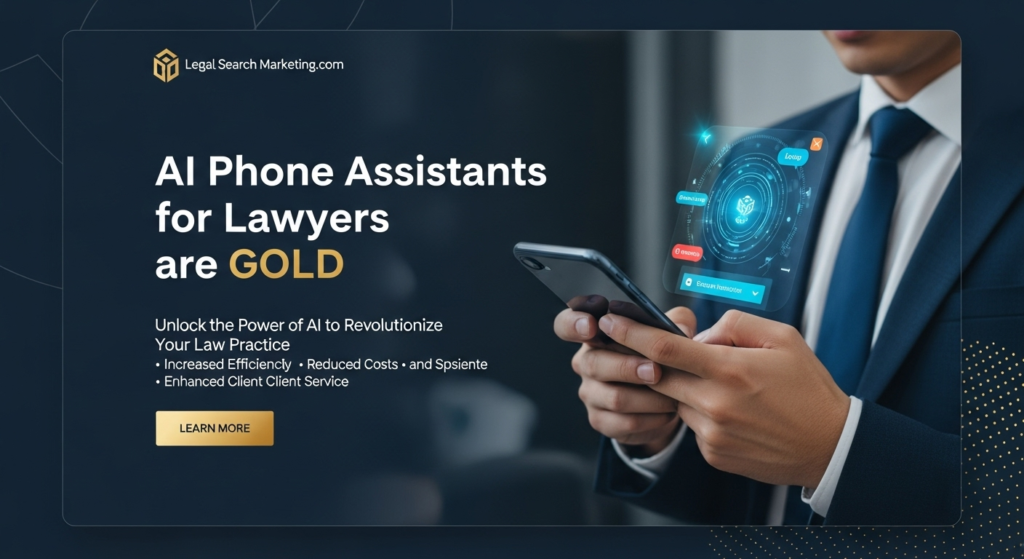Revolutionizing Legal Search Marketing for Lawyers In today’s competitive legal landscape, clients expect immediate answers and personalized service. An AI-powered phone assistant acts as your firm’s tireless virtual receptionist and intake specialist, ensuring no lead is missed and every inquiry is handled professionally, 24/7. This isn’t just about efficiency; it’s about transforming your online presence into a proactive client engagement engine. At Legal Search Marketing.com, we specialize in helping law firms harness the power of AI for superior online marketing results. Ready to see how AI can transform your firm’s digital footprint? 👇Book a 15 Minute Free AI Phone Call Key Features of an AI Phone Assistant for Law Firms: 24/7 Client Intake & Screening: Automatically answers calls, qualifies leads based on your criteria (e.g., practice area, location, urgency), and gathers essential initial information. Intelligent FAQ Answering: Provides instant, accurate answers to common client questions about your firm, practice areas, fees (general, not specific advice), and processes, reducing call volume for your staff. Seamless Appointment Scheduling: Integrates directly with your firm’s calendar to book consultations for qualified leads, sending automated reminders. Lead Nurturing & Follow-up: Can initiate outbound calls or trigger SMS/email follow-ups for prospects who didn’t convert initially. Multilingual Support: Communicate with a diverse client base in their preferred language. Call Routing & Transfer: For complex or urgent matters, the AI can seamlessly transfer calls to a human attorney or paralegal. Detailed Call Logs & Transcriptions: Provides comprehensive records of every conversation, including AI-generated summaries and sentiment analysis, for easy review and compliance. CRM Integration: Automatically pushes lead information and call data into your existing Client Relationship Management (CRM) system (e.g., Clio Grow, Salesforce, HubSpot). Estimated Pricing for a Law Firm (Vapi.ai Based, Example for 500 Minutes/Month) The pricing for a Vapi.ai phone assistant generally involves a one-time setup fee and ongoing monthly operational costs, calculated based on minute usage and integrated AI services. 1. Flat Fee Setup Cost (One-Time Professional Service): Estimated Setup Fee: $1,500-3,000 This fee covers the custom development and configuration tailored to your law firm’s specific needs, including: Persona Development: Crafting the AI’s tone, professionalism, and legal-specific vocabulary. Prompt Engineering: Designing robust conversational flows for intake, qualification, FAQ, and scheduling. Integration: Connecting with your existing calendar (e.g., Google Calendar, Outlook) and CRM (if applicable). Legal-Specific Training: Fine-tuning the AI to understand common legal terminology and client needs without providing actual legal advice. Ethical Guardrails: Implementing strict protocols to prevent the AI from offering legal advice and ensuring confidentiality. Testing & Optimization: Thorough testing with various scenarios and initial fine-tuning. FREE Phone Number Setup: Configuring dedicated phone numbers for inbound and outbound calls. 2. Estimated Monthly Operational Costs (Based on ~500 minutes/month): This estimate covers the Vapi.ai platform, underlying AI models (LLM), Text-to-Speech (TTS), and Speech-to-Text (STT) services. Vapi Platform Fee: $0.05 / minute 500 minutes * $0.05/minute = $25.00 AI “Brain” (LLM Cost, e.g., GPT-4o): ~$0.06 / minute (for AI processing and responding) 500 minutes * $0.06/minute = $30.00 AI Voice (TTS, e.g., ElevenLabs): ~$0.05 / minute (for realistic, human-like voice output) 500 minutes * $0.05/minute = $25.00 AI Listening (STT, e.g., Deepgram): ~$0.01 / minute (for accurate transcription of client speech) 500 minutes * $0.01/minute = $5.00 Phone Number Fees: Typically free for U.S. local numbers. If you port existing numbers or need specific premium numbers, there might be a very minor carrier fee (e.g., $1-5/month per number). Total Estimated Monthly Operational Cost: ~$85.00 – $90.00 (depending on exact LLM/TTS pricing and phone numbers) Total Investment Snapshot: One-Time Setup Fee: $1,500 – $3,000 Ongoing Monthly Fee: ~$100 – $500 (for 500 minutes of usage to 5000 minutes) This represents an incredibly efficient way to manage client intake, qualify leads, and provide 24/7 service without the overhead of additional human staff. ** This AI Phone Assistant can 100% replace a Receptionist and can do a lot of different valuable things. Also it can work 24/7 and will never take a coffee break or 5 daily smoke breaks like Karen! SO even at the highest level where the cost for a year would be like $10,000 at highest amount, compare to whatever a receptionist would cost per year, along with health insurance, 401k, etc. Sorry receptionists, its time to learn AI. Embracing the AI Advantage The legal landscape is evolving, and so too must your marketing approach. AI is not a threat to legal professionals but a powerful tool that, when wielded effectively, can dramatically enhance your firm’s visibility, attract more qualified leads, and ultimately, grow your practice. At Legal Search Marketing.com, we specialize in helping law firms harness the power of AI for superior online marketing results. Ready to see how AI can transform your firm’s digital footprint? 👇Book a 15 Minute Free Call Want to see AI in action for your firm? We’re offering a FREE professional video consultation using VEO3 technology, specifically designed for legal professionals, along with expert social media posting advice. This is your chance to showcase your expertise and stand out online! Click here to claim your free video consultation and social media strategy session today! 📲 Free Site Analysis Why AI is a No-Brainer for Lawyers in 2025: Never Miss a Lead: Most potential clients call during or after business hours. An AI assistant captures these high-intent leads instantly, eliminating missed opportunities. Immediate Engagement: Clients get an immediate, intelligent response, building trust and demonstrating responsiveness from the first interaction. Enhanced SEO & PPC ROI: By effectively handling incoming calls from search ads and organic listings, the AI maximizes the return on your marketing spend by converting more traffic into qualified leads. Time & Cost Efficiency: Automates repetitive intake tasks, freeing up your legal team to focus on billable work and complex cases. It’s significantly more cost-effective than hiring additional human staff for 24/7 coverage. Improved Client Experience: Provides consistent, polite, and efficient service, setting a professional tone from the outset. Data-Driven Insights: Analytics from AI interactions reveal common client pain points, most frequent questions, and lead quality, allowing









